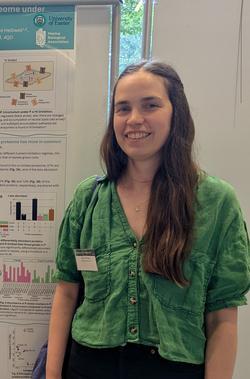Meet Early Career Microbiologist of the Year talk finalist: Ellen Harrison
Posted on September 12, 2025 by Microbiology Society
This year, the Microbiology Society is awarding Early Career Microbiologist of the Year prizes from two streams. Both prizes recognise excellence in science communication by a member who is an undergraduate, postgraduate student or within five years of appointment to their first position.
Each of the finalists, who either presented a poster or offered a talk at Annual Conference 2025, was selected to present their research in the poster or talk final. In the lead-up to the talk final, taking place on 7 October 2025 during the Executive Committee meeting, we speak to talk finalist Ellen Harrison, from Marine Biological Association, University of Exeter, UK.

What are your current research interests?
My current research focuses on how diatoms, which are single celled photosynthetic eukaryotes, sense nutrients and respond to different low nutrient environments. Phytoplankton form the base of aquatic food webs, and in the marine environment diatoms are responsible for ~1/5th of primary production. My project investigates how diatoms cope with co-limitation by nitrogen and phosphorus, and uses novel genetically encoded biosensors to study how diatoms coordinate their nutrient sensing mechanisms in response to nutrient resupply.
What inspired you to go into this field of work?
During my undergraduate degree I really wanted to study whales and dolphins, however my MRes project at the Marine Biological Association, looking at diatoms really altered my career path. Microalgae are so diverse and their role in shaping our environment is often underappreciated. I really enjoyed looking at the diatoms on the microscope and learning new molecular techniques. Since that MRes project I have completed my PhD looking at how green microalgae could be used as a human food source, and now I’m back working on marine diatoms. I am still very excited whenever we can spot dolphins in Plymouth Sound though.
What do you love most about your job?
My favourite thing about my job is when you’ve spent a while troubleshooting a problem and you finally get an experiment to run well, with a good graph to show in the next lab meeting! I also enjoy being able to help the other members of my lab group and see their progress.
Why does microbiology matter?
Climate change, antimicrobial resistance and food security are just a few of the big challenges facing humanity in the near future. Microbiology can hopefully provide solutions to mitigate some of the effects of those challenges. Even without their potential for new technologies microbes are fascinating to study; helping us to understand more about how life functions, and evolved in the first place.
How do Society events, such as Annual Conference, promote your professional development?
I have attended 3 Annual Conferences and each time I really enjoyed the diversity in sessions, and learning about new molecular techniques developed in bacteria that could be tried in our model diatoms. At the most recent conference I was an Early Career co-chair in the Microbial Physiology, Metabolism and Molecular Biology Forum, which was a very positive experience and gave me more confidence to ask questions!
You can find and follow the Marine Biological Association on Instagram at @thembauk and the University of Exeter @uniofexeter on Instagram.
